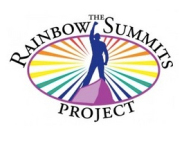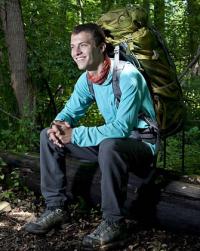
Questions For The Rainbow Summits Project
Cason Crane's QuestionsForLiving interview focuses on the questions that motivated him to create the Rainbow Summits Project and that enabled his success as a mountaineer. This interview took place on April 4, 2013 as Cason prepared for his expedition to Mt. Everest. QFL would like to offer a special thanks to QuestionsForLiving member Alina O'Donnell for suggesting and initating Cason's interview.
****
QuestionsForLiving: Where there specific questions that inspired you to create The Rainbow Summits Project? If so, what were some of these questions?
Cason Crane: The Rainbow Summits Project was inspired by the suicide of a friend of mine in high school and of Tyler Clementi, the gay Rutgers student who was a victim of cyberbullying as a result of his sexuality. It was through these tragedies that I became aware of the issue of LGBTQ youth suicide, and so the very first question in my mind was “What can I do to make a difference on this issue?”
When I decided that I could combine my passion for the cause of LGBTQ youth suicide and my passion for mountaineering to form The Rainbow Summits Project, my next question was “What am I hoping to achieve?” and then “How can I get there?”.
QFL: Were there questions that fueled, and maintained, your passion for mountain climbing? If so, what were some of these questions?
Crane: Whenever I am struggling to maintain motivation or inspiration in mountaineering, I think of the question: “Why did I start climbing?” I love the outdoors, I love nature, I love challenges, I love the companionship of teammates, and I love the feeling of reaching the summit of a mountain. These are the things that drew me to climbing, and so when I am having trouble putting one foot in front of the other, I just ask myself “Why are you doing this?” and gain strength from the many answers that spring to my mind.
QFL: Were there specific questions that you were asking that fueled your desire to support The Trevor Project? If so, what were some of these questions?
Crane: My decision to support The Trevor Project is based entirely on the question: “What non-profit organization is doing the most work to prevent LGBTQ youth suicide in the United States?”
The answer to that question was actually very easy – The Trevor Project operates the country’s only 24/7, free and confidential suicide lifeline for LGBTQ youth, in addition to providing a range of other suicide prevention and crisis services. I then asked myself several follow-up questions: “Is The Trevor Project financially responsible and could it use the support I would bring?” and then “Do I identify and agree with The Trevor Project’s mission?” and finally “Will The Trevor Project support me in my endeavor to climb these mountains and raise funds and awareness for them?” Obviously, the answers to these questions were all positive and so I began my partnership with this great organization.
QFL: Were there specific questions that inspired you to and climb the world’s highest mountains as a method for supporting The Trevor Project? If so, what were some of these questions?
Crane: The specific question that I asked myself in the beginning of the creation of my Rainbow Summits Project was “How can I give back on this issue in a unique and meaningful way?” This led me to brainstorm and reflection on my strengths and interests. Ultimately, I realized that I could combine two of my passions: my love of mountaineering and my desire to give back on this issue, and create The Rainbow Summits Project.
QFL: Are there specific questions that you ask yourself that contribute to your successful ascents of Kilimanjaro, Carstensz Pyramid, Vinson, Mt. Elbrus, and Aconcagua? If so, what were some of your questions?
Crane: Though each of these climbs was unique and posed different challenges, there were a couple unifying questions that I asked myself. When on a mountain, one has to constantly be aware of himself, so the first question I’m asking myself is always “How am I feeling? How is my body today?” If you aren’t aware of your physical and mental state, you are putting yourself and your team at risk. My second question is then, “How are my teammates doing?” This question can also be critically important. For example, when I was climbing down the knife-edge ridge on Denali at 16,500ft, I noticed that one of my teammates was having a tough time. He was tired and appeared to be limping slightly. Because of this, I was extra cautious on the ridge and kept an eye on him in case something happened. Luckily, because I had raised my awareness, I wasn’t taken by surprise when he fell off the ridge and began to pull us down the mountain. I was able to quickly self-arrest and stop our fall. Had I not been asking myself those questions, who knows that might have happened.
QFL: Are there specific questions that you have asked that have contributed to your success in the raising over $100,000 for The Trevor Project? If so, what are some of these questions?
Crane: The question I ask myself when it comes to fundraising effectively on this issue is: “How can I share and explain my passion for this cause with others?” The reality of the issue of youth suicide, especially in the LGBTQ community, is that it is more widespread than people realize. So my is often to just begin a discussion of this issue. Once people start to hear more about it and talk about it with others, they realize the gravity and tragedy of the status quo and the benefits that The Trevor Project’s services provide and then the fundraising becomes almost an afterthought.
QFL: Based on your experiences, are there some specific questions that you would advise people to ask themselves when raising money to support an organization? If so, what are some of these questions?
Crane: The questions I would recommend asking oneself before raising money to support an organization are:
“Why are you supporting this specific cause/organization?” This is a critical question because you need to be truly passionate and committed to the cause or organization to be a successful fundraiser.
And “How much do I want to raise, and how can I get to that number?” This is important in terms of planning your drive and developing a realistic and concrete plan for reaching your target.
From there, the next step is, “Who do I know can and will support my efforts?” It is important to gather a critical mass of people whose support you can count on.
QFL: Based on your experiences are there some questions that people should ask for mountain climbing? If so, what are some of these questions?
Crane: What set mountaineering apart from hiking or trekking is the challenge and the risk, so the first question I would pose is: “Do you enjoy seriously challenging your mind, body and spirit, and pushing it to the breaking point?” And then I would follow up with: “What are you willing to potentially sacrifice to experience that challenge?” Mountaineering demands that we recognize that we might sacrifice our own life to overcome the challenges it poses. Beyond that, the questions are not much different from any other from of physical exercise and exertion.
QFL: Independent of climbing and your development of The Rainbow Summits Project, what questions do you believe that people should / could ask themselves to make our world a happier and healthier place?
Crane: I think that people too often ask themselves “What do I enjoy?” and don’t often enough ask “What can I do to help someone else enjoy his or her day more?” I try to live my life combining the things I enjoy and the things that I can do to give back to others. It’s not just enough to be focused on one’s own happiness; we also need to consider others’ happiness. I’ve learned that when we do ‘think of the other guy first,’ we both end up better off as a result.
For additional information regarding Cason Crane and The Rainbow Summits Project, please click here:
Cason Crane
Bio
Cason Crane has been climbing all over things (mostly his four little siblings) since he was a kid. He caught the mountaineering bug when he climbed Mt. Kilimanjaro with his mother in 2008 at age 15. Since then, he has climbed mountains in the United States, New Zealand, Russia, Switzerland, France, and Argentina. He has traveled to over 65 countries and all seven continents, and has done numerous volunteer missions in Africa, Asia, and North America. He is also an avid runner, swimmer, and triathlete. He completed his first Ironman in New Zealand in January 2012.
Cason graduated cum laude from Choate Rosemary Hall in 2011 and will join the Princeton University Class of 2017, where he hopes to study International Relations at the Woodrow Wilson School of Public and International Affairs.
Homepage
http://www.rainbowsummits.org


